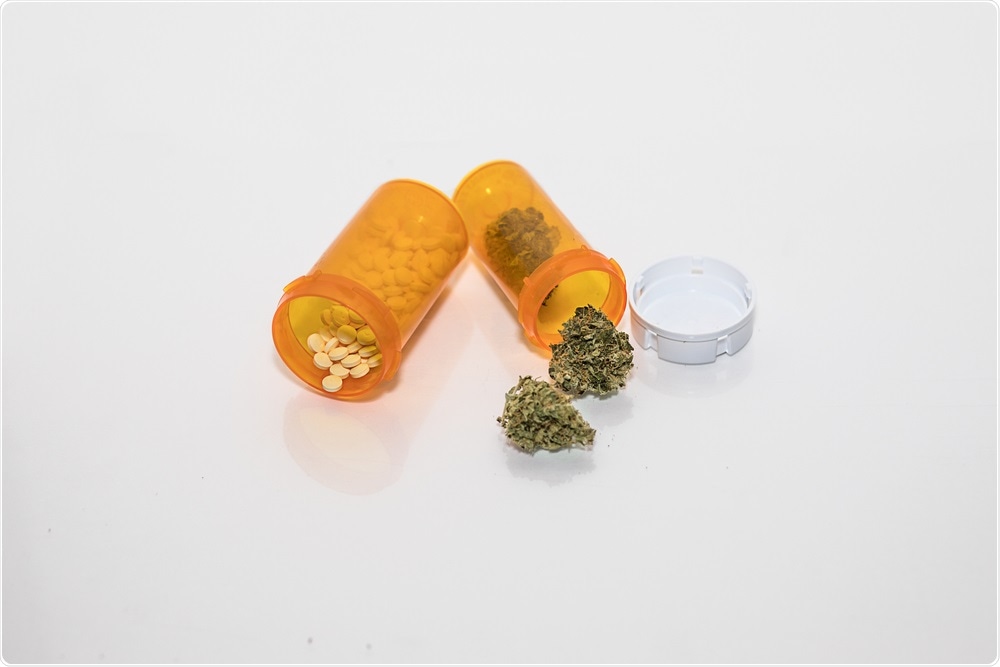Although opioids exhibit impressive analgesic effects against both chronic and acute pain, the increased prescription rate of this class of drugs has been accompanied by an increase in opioid-related mortality. Legislators believe that the passage of cannabis access laws will play a significant role in addressing the ongoing opioid crisis, which claimed 70,000 deaths in the United States in 2017.
 Olga Enger | Shutterstock
Olga Enger | Shutterstock
Substituting cannabis for opioids
After an extensive literature review in 2017, the National Academies of Sciences, Engineering and Medicine deemed cannabis to be effective in the treatment of chronic pain in adults. This conclusion, which has been largely supported by various clinical studies, considers the moderate side effects linked to the long-term use of cannabis as compared to the more extreme side effects associated with opioid use.
Analyzing the impact of cannabis legalization on opioid addiction rates
Reduced opioid prescriptions
Various studies have investigated how an increase in the passage of both medical cannabis laws (MCLs) and recreational cannabis laws (RCLs) can reduce opioid consumption and challenge the ongoing opioid epidemic.
A 2018 study demonstrated that the use of opioids in Medicare beneficiaries dropped by 8.5% following the passage of an MCL. A second study demonstrated similar results in which the passage of both MCLs and RCLs were found to reduce opioid prescriptions by 5.9% and 6.4%, respectively. Overall, both MCLs and RCLs have been shown to reduce the total demand for opioids in similar manners.
While cannabis access laws like MCLs and RCLs do not directly reduce the availability of opioids, research has found that the passage of these laws allows for cannabis prescriptions to substitute those typically written for opioid medications.
In fact, several studies have found that up to 60% of patients in states with cannabis access laws will substitute cannabis for prescription opioids. It is important to note that this reduction is specialty-specific within the five specialties that are associated with the highest mean annual opioid prescriptions. These specialties include orthopedic surgery, oral and maxillofacial surgery, sports medicine, pain medicine, as well as physical medicine and rehabilitation.
The “gateway” debate
With all of the evidence in mind, researchers are hopeful that legislators will be able to better address the ongoing national and statewide debates regarding the legalization of cannabis. In an effort to speak to the common concern that cannabis acts as a “gateway” drug, researchers have found that the passage of MCLs does not lead to an increase in cocaine or heroin usage.
Decreased medicare spending
By substituting prescription pain medication, particularly opioids, with cannabis products, research has found that Medicare spending could be reduced by as much as $150 million USD in the United States as a result of reduced prescription drug reliance.
Lower vehicle fatality rates
Various studies have also investigated how the passage of cannabis access laws can also reduce the negative effects that are often associated with opioid use. For example, a 2016 study determined that there is a significant decrease in opioid positive test results in drivers following fatal car accidents in states that have passed MCLs.
It is also important to note that in Washington and Colorado, which are the two first states to have passed RCLs in the U.S., did not see an increase in cannabis-related traffic fatality rates since the passage of their cannabis access laws.
Source:
This article summarizes the information found within: McMichael, B., Van Horn, R. L., & Viscusi, W. K. (2018). The Impact of Cannabis Access Laws of Opioid Prescribing. SSRN Electronic Journal. DOI: 10.2139/ssrn.3266629.